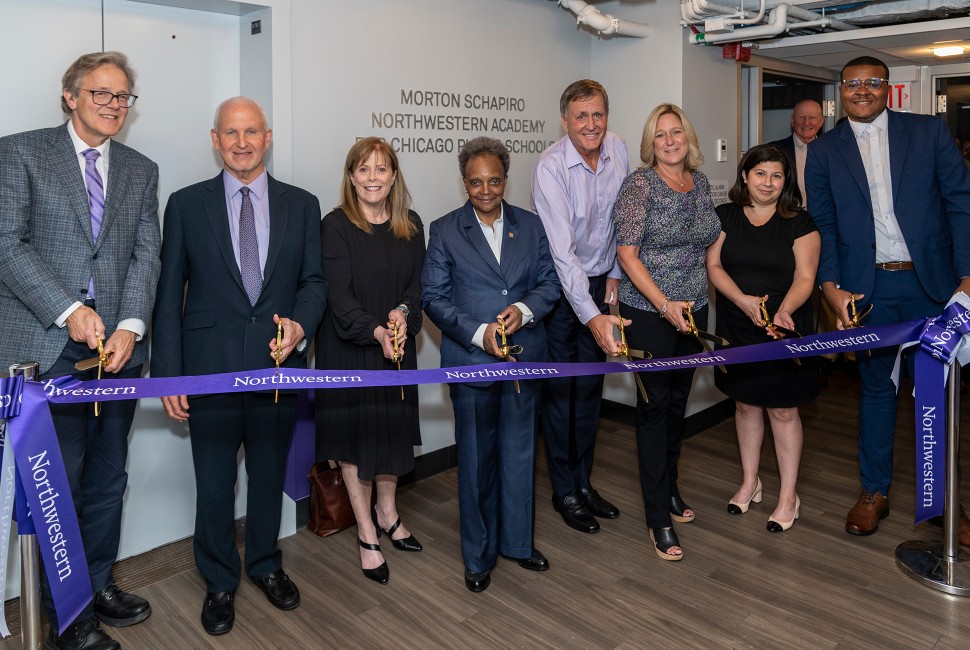Chicago Mayor Lori Lightfoot ’20 H joined community members at Abbott Hall on Northwestern’s Chicago campus to celebrate the formal dedication of the Morton Schapiro Northwestern Academy for Chicago Public Schools, which has provided mentorship and college-prep resources to hundreds of CPS students.
The academy is a free, multiyear college-access and enrichment program for academically motivated high school students from diverse backgrounds, including many first-generation and low-income students. Formerly known as the Northwestern Academy for Chicago Public Schools, it was recently endowed and renamed in honor of President Schapiro with a multimillion-dollar gift from the Potocsnak family.
The Aug. 10 event was a moving testament to the transformative power of mentorship and education. All of the speakers touched on their own personal educational journeys in heartfelt and thoughtful ways. Speakers included Dan P. McAdams, interim dean of Northwestern’s School of Education and Social Policy; Cassandra Salgado, director of the academy; former CPS student and academy graduate Ernest Willingham; Mayor Lightfoot; President Schapiro; and John Potocsnak, a Chicago industrialist and program donor.
Good Neighbor, Great University initiative
The academy, which was established in 2013, is part of Northwestern’s broader Good Neighbor, Great University initiative. Salgado highlighted some of the resources that the program provides to students, including college tours, test prep, help with applications to colleges and financial aid programs, and other advising and mentoring. Northwestern, she said, has become a leader among universities partnering with cities on educational programs in schools, thanks to donors like the Potocsnaks.
“This gift will have an impact for years to come,” Salgado said. “I can’t tell you how great it is to know that we’re going to go beyond just keeping the lights on. This is about broadening the margin of excellence for students as they continue not only to represent the academy as they go on to colleges, but their communities, their high schools and the City of Chicago.”
For the students, the program can have a transformative impact. Many are high achievers, but they often have limited resources and context when it comes to pursuing opportunities beyond their immediate circumstances.
“I can honestly say that Northwestern Academy changed my life,” said Willingham, who is currently an undergraduate on the pre-med track at Northeastern University in Boston, where he is a Torch Scholar on a full scholarship. “The countless advising sessions, mentorship and incredible college tours completely changed the trajectory of my academic career.”
Last spring, Willingham, who grew up on Chicago’s West Side, testified before a U.S. Senate committee about protecting children from gun violence, which has personally affected him. He has already been accepted into medical school at the Icahn School of Medicine at Mount Sinai Hospital in New York.
Lightfoot said that Willingham’s story and dedication to making the world a better place were “proof positive of why this program is so important.” She went on to thank President Schapiro, saying it was “emotional” to be speaking not only about the academy, but more broadly in gratitude for his personal friendship, leadership and legacy as someone with a deep commitment to Chicago and CPS students.
“We need to encourage our young people to dream big,” Lightfoot said. “Because it does make a profound difference in the quality of their lives, the quality of their families’ lives, and ultimately, the quality of our city.”
More than 300 students from 40 Chicago schools
Both Lightfoot and Schapiro emphasized the success of the program, which has already matriculated more than 300 students from about 40 high schools across the city. About 88% are first-generation college students in their families, and 96% identify as members of underrepresented groups. The average GPA for students in the program is 3.8.
On May 14, the academy honored its newest class of graduates. Over the summer, the rising senior class also visited colleges ahead of the fall application period. The vast majority go on to pursue undergraduate degrees at a variety of colleges and universities, including top-tier private ones like Northwestern — which, Schapiro noted, happened to be the most popular choice among academy graduates last cycle. Seven former academy students are planning to attend Northwestern, even though the program was not designed to bring students to Northwestern specifically, he said.
Schapiro, who announced in March 2021 that he would be stepping down, said that the academy was among the things he was most proud of as Northwestern’s president. It was an example, he said, of his philosophy that big problems can be solved by changing the world one person at a time, and that making meaningful change isn’t just about admitting more underrepresented students, but giving more of those students a chance to succeed from the beginning, before they even apply to college.
Schapiro said of the academy students: “These are brilliant people who just needed someone who would invest in them, tell them that they were special, and [encourage] them to raise their eyes up to the sky and think about broader aims.”
Benefactor John Potocsnak reflected on his own journey and the importance of education, and although he’s not a Northwestern graduate, said the University under Schapiro’s leadership has been a huge part of his life.
“I’ve been asked why I do the things I do,” Potocsnak said. “[It’s] what I wish people would have done for me … When I think about why I have achieved what I have, I think a lot of it has to do with people like Morty.”
Potocsnak said that he was thrilled to be able to support academy students and would continue to join others in making a difference for as many students as possible. Following a standing ovation for Potocsnak — one of several for the evening’s speakers — the event closed with a ribbon-cutting ceremony and reception.


